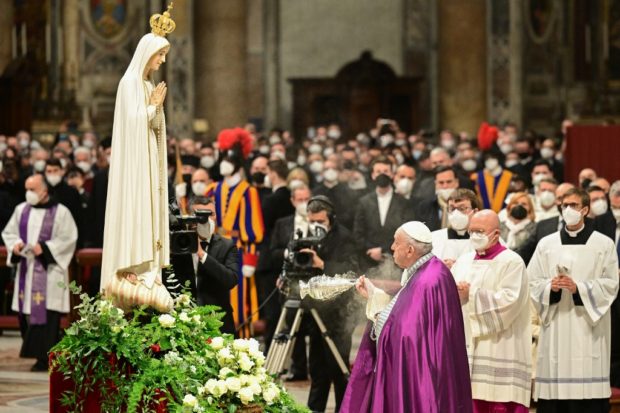
Pope Francis (R) swings a thurible of incense before a statue of Our Lady of Fatima, during a penitential celebration service in St. Peter’s Basilica on March 25, 2022 in The Vatican, during which he is to consecrates Russia and Ukraine to the Immaculate Heart of Mary, based on the Marian apparitions reported in 1917 by three shepherd children at the Cova da Iria, in Fatima, Portugal. (Photo by Vincenzo PINTO / AFP)
VATICAN CITY — Pope Francis led the world’s Catholic bishops on Friday evening as they prayed for peace between Russia and Ukraine.
The Pope presided at a service in St. Peter’s Basilica, entrusting the protection of all humanity, “especially Russia and Ukraine,” to Mary, who Christians believe is the Mother of God.
In one of the most precisely coordinated global Church events in living memory, thousands of bishops in cathedrals and chapels around the world read the prayer led by Pope Francis at about the same time in their native languages.
The Pope also delivered a homily, saying the world had forgotten the tragedies of the 20th century and was still menaced by nuclear war.
‘Unjustified aggression’
He spoke of “scenes of death” in which “bombs are destroying the homes of many of our defenseless Ukrainian brothers and sisters,” and of “a cruel and senseless war that threatens our world.”
Both the Ukrainian and Russian ambassadors to the Vatican attended, sitting on separate sides of the aisle.
Since Russia invaded its neighbor on Feb. 24 in what it called a “special military operation,” the Pope has implicitly criticized Moscow.
He condemned what he called an “unjustified aggression” and denounced “atrocities,” but stopped short of mentioning Russia.
But on Friday, he used the words Russia and Russians as part of his prayer and homily.
“We have forgotten the lesson learned from the tragedies of the last century, the sacrifice of the millions who fell in two world wars, [and] we have closed ourselves in nationalist interests,” the Pope also said in his “Act of Consecration to the Immaculate Heart of Mary.”
The prayer denounced the stockpiling of weapons, the destruction of the environment and the spread of abortion.
It asked Mary to “eliminate hatred and the thirst for revenge, and [to] teach us forgiveness, free us from war [and] protect our world from the menace of nuclear weapons.”
Archbishop Visvaldas Kulbokas, the Vatican ambassador who has remained in Ukraine since Russia launched its invasion, said before Friday’s event he would read the prayer from a makeshift altar in a kitchen in the embassy in Kyiv.
‘Message of Fatima’
In the Portuguese town of Fatima, papal envoy Cardinal Konrad Krajewski, one of the Pope’s closest aides, read the prayer near the spot where Mary was said to have appeared repeatedly to three shepherd children on July 13, 1917.
The link with Fatima is essential to understanding the religious and political significance of Friday’s consecration.
According to the Church, Mary asked that Russia be consecrated to her, lest it “spread her errors throughout the world, causing wars and persecutions of the Church.”
She also warned that “various nations will be annihilated.”
After the Russian Revolution of 1917 and during the Cold War between the West and the Soviet Union in the postwar era, the “Message of Fatima” became a rallying point for anticommunism in Christianity.
Similar acts of consecration were performed by past popes in 1942, 1952, 1964, 1981, 1982 and 1984.
The Pope mentioning Russia on Friday’s prayer was welcomed by some Church traditionalists who otherwise generally oppose Pope Francis.
They said that some or all consecrations by his predecessors may not have been valid, since they did not adhere to Mary’s explicit instruction on the “consecration of Russia.”
RELATED STORIES
Pope: Ukraine invasion ‘unacceptable armed aggression’
CBCP: Filipino bishops to join Pope Francis in consecrating Russia, Ukraine to Mary
Pope called Ukraine president; expressed ‘profound pain’

